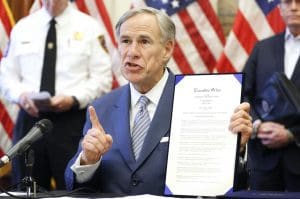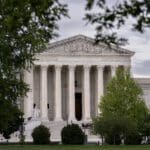GOP governors are using coronavirus to try to ban abortion
GOP officials are using the pandemic as an opportunity to push their right-wing agenda.

As states grapple with the coronavirus pandemic, making hard choices about what types of businesses and services can stay open, some Republican governors have used it as an opportunity to try to shut down abortions in their states.
These are the latest in a string of recent attacks on abortion rights. Conservative senators have banded together to try to ban telemedicine abortions, which allow people to easily obtain an abortion early in pregnancy even in areas where health care is otherwise hard to access.
Some senators, including Majority Leader Mitch McConnell, have tried to push through so-called born-alive bills that stigmatize women seeking later abortions and threaten doctors with claims that the procedures amount to murder.
And of course, Donald Trump has claimed at his rallies that later abortions are infanticide, a harmful claim that has been debunked again and again.
Texas has been the most successful of the states seeking to stop abortion during the pandemic. Republican Gov. Greg Abbott told health care facilities in Texas not to perform procedures that aren’t “medically necessary,” and the state’s attorney general, Republican Ken Paxton, said that meant abortions cannot be performed unless the pregnant person’s life is in danger.
If providers violate the law, they could be fined $1,000 or sent to jail for up to 180 days. Paxton also said that abortion, “for the most part, is an elective procedure that can be done later.”
A federal district court judge in Texas initially blocked the abortion ban from going into effect, but the Fifth Circuit Court of Appeals upheld the ban. The state can bar almost all abortions during the outbreak.
Similarly, in Ohio, Republican Attorney General Dave Yost sent a letter to the state’s abortion providers ordering them to “immediately stop performing non-essential and elective surgical abortions.” He defined the procedures as “those that can be delayed without undue risk to the current or future health of a patient.”
Planned Parenthood in Ohio vowed to continue providing abortion services and sued the state over the ban. A federal district judge issued a two-week temporary restraining order, so abortions can continue in the state for now. However, later abortions remain barred in Ohio, where they can only be performed past 20 weeks if the pregnant person’s life is endangered or their health is severely compromised.
Alabama also tried to use the pandemic to block all abortions in the state, but a federal district court suspended its ban until arguments can be heard later this month. People in Alabama still can’t obtain a later abortion, with a 20-week ban similar to Ohio’s in effect in the state.
Alexis McGill Johnson, the acting president and CEO of Planned Parenthood Federation of America, said in a statement that “a public health emergency is not the time to play politics” and noted that abortion is a “time-sensitive medical procedure.”
The American College of Obstetricians and Gynecologists has recognized that “induced abortion is an essential component of women’s health care.”
The state bans put into place in recent weeks are designed to eliminate, not just restrict, abortions. States are effectively using the pandemic to argue that abortions are not essential and that time is not critical in obtaining abortions, pushing medical care out of reach for many in need.
If these states succeed in locking down access to abortion for the duration of the pandemic, it may result in people not being able to obtain abortions at all.
Published with permission of The American Independent Foundation.
Recommended

Rosenblum, other Democratic AGs ask SCOTUS to block red state bans on emergency abortions
Oregon Attorney General Ellen Rosenblum and nearly two dozen other Democratic-led states urged the U.S. Supreme Court to preserve the ability of emergency room doctors to provide abortions, arguing that failing to do so would have devastating effects for their health care systems and women across the country.
By Gloria Rebecca Gomez, Arizona Mirror - April 01, 2024
Ken Paxton paid $2.3 million to defense lawyers for impeachment trial
The lawyers were paid from his campaign, according to a report filed this week.
By Patrick Svitek, The Texas Tribune - January 18, 2024
Texas governor and attorney general do little to curb state’s chemical plant crisis
Republicans Greg Abbott and Ken Paxton have taken thousands of dollars in donations from chemical companies and their affiliated PACs.
By Jesse Valentine - December 08, 2023








































































